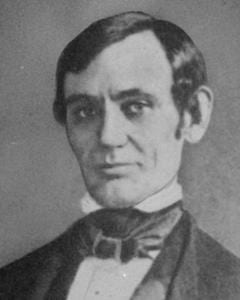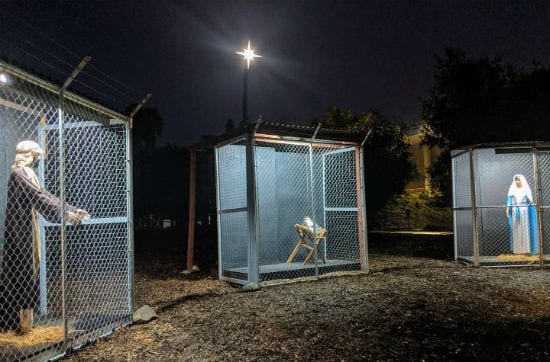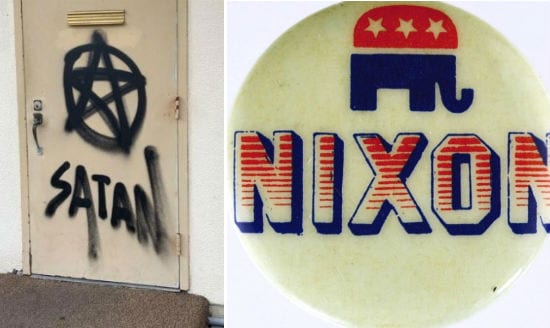Slate's Jack Shafer wonders why the mainstream press has been dismissive of Stephen F. Hayes' report in The Weekly Standard on alleged links between Saddam Hussein and al-Qaida.
Hayes' article largely summarizes a memo by Undersecretary of Defense Douglas J. Feith, which may account for some of the skepticism. Feith does not enjoy a reputation as a disinterested pusuer of the truth. Like many of his fellow hawks in the Bush administration, he has a track record of reaching conclusions first, then subsequently marshalling arguments and alleged evidence to support them. (WMD anyone?) After repeatedly swallowing the hook, reporters should be expected to sniff warily at the latest bait proffered by Feith et. al. Fool me once, etc.
But the strongest argument against Feith's claims does not come from the Bush administration's critics, but from the Bush administration itself.
The White House and Pentagon have worked very hard to imply a connection between Saddam and al-Qaida, but have studiously avoided an explicit assertion of this claim. President Bush, on countless occassions, has mentioned Saddam and Osama bin Laden, 9/11 and Iraq, in consecutive, non sequitur sentences while scrupulously avoiding the claim that some are now saying Hayes' article supports.
The clearest, most logical explanation for this behavior is that this is because the administration lacks evidence to support such a claim. While establishing such a link has clearly been in their interest — as the most forceful argument to initiate and now to continue the war on Iraq — they have been cautious in not overstating the claim that such a link can be demonstrated. If they had evidence, it stands to reason, they would have every reason to share such evidence with the public and the world.
When surveys showed that a majority of Americans believed in such a link, critics attacked the Bush administration for promoting the idea. The administration's defense was, again, telling. They did not justify having made the claim because it was true, they denied ever making the claim at all. The administration and its defenders were aggressively defensive on this very point. We never said they were connected, they insisted, challenging their critics to produce any quotes or examples of where they had explicitly made such a claim.
A lawyerly parsing of their language shows that this is more or less true. They never made this claim in so many words. The implication of this disavowal is again clear: if they believed the claim to be demonstrably true, and they had evidence to support it, why such an aggressive denial of having uttered the words?
Hayes' report is itself more cautious than the way the Standard is playing it up. They titled it "Case Closed" and framed it as conclusive, undeniable evidence of a link between Saddam and Osama — the two are portrayed on the Standard's cover grinning at one another. What's more, they argue that the Bush administration has, and has had all along, the evidence of such a link.
To accept the Standard's position, one must somehow account for the administration's bizarre reluctance to make this claim and for its defensiveness when accused of having said what it supposedly can prove to be true.
To accept that Feith's memo "closes the case" one must accept that:
1. The Bush administration had evidence supporting the strongest case for the invasion of Iraq, but chose not to share this evidence with the American public or the U.N. Security Council, choosing instead to base its case for war on more tenuous claims, including some that were demonstrably false (Niger, "45 minutes," "mushroom cloud," aluminum tubes, etc.).
2. Although they knew this claim to be true, and could prove it, the administration meticulously avoided ever stating it, relying instead on a baroque rhetoric of inference and implication.
3. President Bush himself and his many defenders have indignantly denied the suggestion that they have even hinted at making this claim — never insisting that it was demonstrably true.
Consider the recent thin-skinnedness displayed in the recent brouhaha over whethr or not anyone in the administration ever explicitly claimed that Iraq presented an "imminent" threat to America's national security.
The indignation was palpable. No one ever suggested such a thing, the administration's defenders scowled.
Well, why not? If Saddam and Osama are linked conclusively — "case closed" — then doesn't that suggest that Iraq did in fact present an imminent threat? Such a link might actually entail even more than that — it would possibly mean that Iraq was an aggressor, already complicit in lethal attacks on American soil. Why deny that you ever said the words "imminent threat" if you already possess conclusive evidence of an established, existent threat?
And why — to consider another whole rhetorical realm that is unnecessary if the Standard's claims are true — would you talk of a "pre-emptive" war when you possess evidence that it was actually in a sense a defensive and retaliatory action?
Why weaken your case and alienate your allies and the entire international community with this frightening, unprecedented doctrine of "pre-emption" if you possess evidence that the invasion of Iraq is of a piece with the widely supported, internationally condoned campaign in Afghanistan?
The editors of the Standard and others, like William Safire, who are desperate to prove a Saddam/Osama link need to explain this strange, self-defeating behavior by the Bush administration. Why has the White House steadfastly, defensively denied its own strongest case for the war?
The most obvious explanation, and the simplest, is that this is not its strongest case. The most probable explanation is that no such conclusive evidence of a link exists.
But the Standard and Safire reject this simple explanation, opting instead for a conspiracy theory that goes beyond anything Oliver Stone could have imagined. They would have us believe in a massive cover-up perpetrated by the Bush administration against itself.
As conspiracy theories go, this one takes the cake. I've heard a lot of wacky theories about who really killed President Kennedy, but I haven't heard anyone suggesting that JFK pulled the trigger himself.












